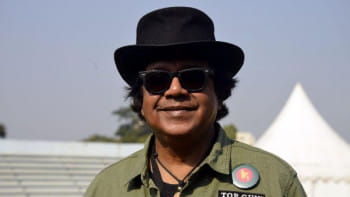Asif Akbar declines Betar and BTV offers after 18 years of blacklisting

Asif Akbar, one of the most popular singers in Bangladesh, had been unofficially blacklisted by Bangladesh Betar (Radio) and Bangladesh Television (BTV) for 18 long years. However, after the fall of the Awami League government on August 5, the artiste's name was swiftly reinstated on the "white list" overnight.
Since then, Asif has received numerous calls from Betar and BTV, inviting him to appear in several upcoming music programmes. Yet, unlike many others in his position, Asif remains steadfast. True to his principles, he hasn't been swept up by the sudden attention. Instead, he has politely declined these offers, citing the 18 out of 24 years of his career spent in exclusion, saying he sees no reason to change course now.
Reflecting on the invitations, Asif shared, "An employee from Bangladesh Betar reached out, asking me to participate in one of their programmes. Despite her sincere request, I had to respectfully decline. There are others at the station who have long wanted to air my songs but couldn't—now they finally can. I also received a call from Bangladesh Television. The producer expressed a desire to start fresh with me. I turned him down politely as well. Not long ago, I noticed my song playing on BTV, but my name had been replaced with someone else's."
Beyond these state-run media outlets, Asif Akbar made a significant announcement regarding his future in the music industry. "In my 24-year career, including the 1/11 government, 18 years were taken from me. Now, I'm no longer in my youth but in middle age. I used to perform occasionally on private TV channels, but I've stopped doing that as well, and I won't be singing on those platforms again. I've grown used to these long gaps in my career. My hair is thinning, and some strands have turned white. My eyesight has also begun to fade. Still, I'm grateful to the state for allowing me to remain in the country."
Though a new era has dawned in Bangladesh, Asif's words carry a quiet pride, tempered by the weight of 18 years of being sidelined by the state. Despite this, he hinted at stepping aside for a new chapter in the country's music scene, almost as if willingly relinquishing his place.
"Singing is my livelihood," Asif said, "and I plan to continue performing on stage for a few more years. Millions of people love me, and I want to sing for them—they've been deprived for so long! Now, it's time for someone else to take my place at Betar and BTV, and I'll find joy in watching them succeed."
It's worth noting that Asif Akbar is widely regarded as the most successful contemporary artiste in Bangladesh's music industry. For the past 18 years, he has faced political exclusion due to his support for the BNP, which not only led to his ban from Betar and BTV but also restricted him from performing at both local and international stage shows.

 For all latest news, follow The Daily Star's Google News channel.
For all latest news, follow The Daily Star's Google News channel. 









Comments